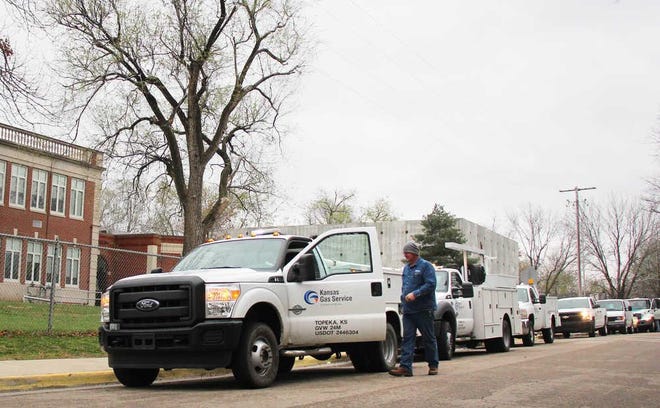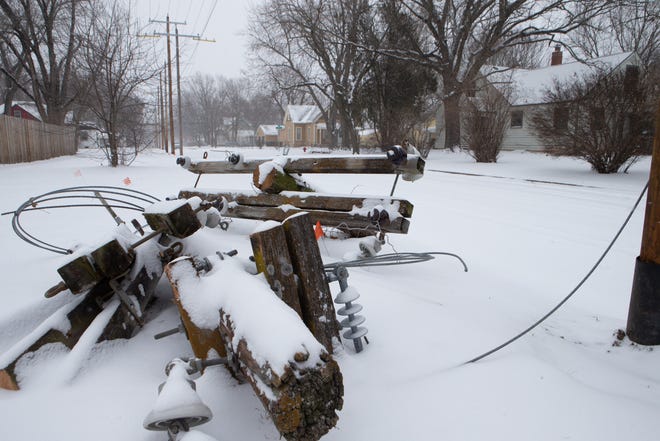Kansas Gas Service Customers May See Their Utility Bills Rise

[ad_1]
Customers of the state’s largest natural gas utility could see their bills increase by $ 5 to $ 17, depending on how the company chooses to pay for cost increases caused by winter storms in February.
The plans, filed by Kansas Gas Service with state regulators on Friday, are part of the company’s efforts to securitize bonds in a bid to repay more than $ 450 million in extraordinary costs due to the historically cold temperatures seen throughout. the region earlier this year.
The documents argue that prices per unit of natural gas eclipsed the highest cost recorded in the past 15 years and were several times higher than those normally seen in February.
“Daily index prices in the gas market have reached unprecedented levels,” according to the documents. “KGS could not have negotiated with the suppliers for price reductions during the winter event and there was a high probability that the supply would not have been available if KGS had not purchased the gas supplies. when it did and it is likely that customers would have lost service during the colder days of the winter event. “
KGS has proposed plans for it to collect securitization bonds over five, seven or 10 years, depending on the plan ultimately chosen by the company and what regulators approve. The cost for residential subscribers would be between $ 5 and $ 11.
The final cost to residential consumers would be around $ 600, with businesses large and small paying thousands of dollars in years to come.
The company touted the benefits of cost securitization, where several costs are bundled together and sold to a third-party company in the form of bonds, saying it would save customers more than $ 140 million. Another plan would result in a higher fee, $ 17 per month, charged to taxpayers.
Following:Kansas utilities and municipalities plan to recover record energy bills. Here is what they offer.
“This is such an extraordinary case”
The Natural Gas Transportation Customer Coalition said in an amended KCC filing Monday that the total cost to Kansas taxpayers across all utilities would be over $ 1 billion. James Zakoura, an Overland Park lawyer who represents the NGTCC, called the fallout from the winter storm “Kansas’ biggest economic story in 50 years.”
“What’s most tragic about it is that customers and taxpayers are going to pay $ 1 billion and they don’t get anything for it – that’s seven days of gasoline,†Zakoura said. “If we paid $ 1 billion for a wind farm, nuclear facility, or natural gas facility, it would last 40 years. Or if we took $ 1 billion and replaced all the pipelines, we would have newer and older pipelines. sure. “
Zakoura also called for more transparency in the KGS case, noting that none of the invoices, purchasing plans or other source documents have been made public so consumers can confirm the extent of the costs.
A first attempt to force the documents to be released failed, but Zakoura said he was optimistic about his chances of winning in light of the payment plan submitted by KGS.
“It’s a billion dollars,” he said. “This is such an extraordinary case that the balance has to be on disclosure to the taxpayers.”
Utilities increasingly seek to recoup their costs after winter storms
KGS is not the only utility seeking to recover the costs of storms. Municipalities are looking to repay state loans for utilities, which have also seen their energy bills skyrocket.
Additionally, Evergy, the largest electric utility in much of eastern Kansas, proposed a charge of $ 4.69 per month for the next two years to offset the $ 153 million in extraordinary costs incurred by the company.
The KCC has already given Evergy the option to defer costs, but the agency is reviewing the exact plan and seeking public comment.
Likewise, the KCC is evaluating a plan by Black Hills Energy, a natural gas supplier primarily serving south-central Kansas, which could see customers paying an additional $ 12.23 per month for the next five years.

State and federal predatory pricing investigations are still ongoing and are unlikely to be concluded anytime soon. Any relief from those probes will result in credit for KGS customers, the company said.
KGS said in its documents that it was maintaining service to 99.9% of all customers during winter storm Uri, which plunged the state into a record-breaking cold spell that saw periodic outages, as the network regional was trying to prevent widespread blackouts.
The only extended outage occurred in Topeka, affecting 82 residential customers, and was due to higher than expected usage from a commercial customer in the region.
[ad_2]
